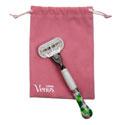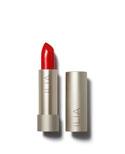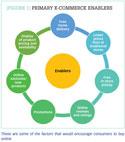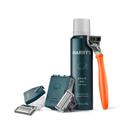Brands
Venus Launches Limited Edition Razor In Partnership With Remi Cruz

Gillette Venus has teamed up with Remi Cruz, an entrepreneur and YouTube personality, for the launch of a limited-edition razor. The Venus x Remi razor has a handle printed with a tropical design and is available for the holiday season exclusively on the new Venus Direct subscription platform. [Image Credit: © Procter & Gamble]
Procter & Gamble To Acquire Walker & Co.
 Walker & Company Brands, which makes health and beauty products for people of color, announced it will be acquired by Procter & Gamble for an undisclosed amount. The company’s brands include grooming line Bevel, targeting men with coarse or curly hair, and FORM Beauty, a hair care line for women with textured hair. The brands are primarily sold direct-to-consumer, but Bevel can also be found in Target stores, and Sephora stocks Form Beauty products. Bevel has taken a different approach to marketing Dollar Shave Club, relying less on paid media and more on social-media and word-of-mouth. P&G says it wants to learn about how Walker builds and uses authentic connections, and Walker aims to leverage P&G's expertise in developing, distributing and marketing products, and how to build the brand internationally. [Image Credit: © Walker & Company Brands]
Walker & Company Brands, which makes health and beauty products for people of color, announced it will be acquired by Procter & Gamble for an undisclosed amount. The company’s brands include grooming line Bevel, targeting men with coarse or curly hair, and FORM Beauty, a hair care line for women with textured hair. The brands are primarily sold direct-to-consumer, but Bevel can also be found in Target stores, and Sephora stocks Form Beauty products. Bevel has taken a different approach to marketing Dollar Shave Club, relying less on paid media and more on social-media and word-of-mouth. P&G says it wants to learn about how Walker builds and uses authentic connections, and Walker aims to leverage P&G's expertise in developing, distributing and marketing products, and how to build the brand internationally. [Image Credit: © Walker & Company Brands]
Moondust Hair Wash, A New Powder Shampoo, To Be Sold D2C
D2C Brands Closing The Search Volume Gap To Big Brands In The UK
 A Google search trends study for the UK found direct-to-consumer brands lagged larger brands in search interest last year, but some are closing the gap. Gillette had double the searches of Dollar Shave Club in 2018, according to the study commissioned by Marketing Week. Searches for DSC grew by over 430 percent, and but searches for Gillette fell 2 percent. Huel, a meal replacement drink brand, saw about two-thirds of the search volume of established rival SlimFast, and its UK search volumes grew 92 percent in the year. The top fastest-growing D2C brands for search volumes in 2018 were Dollar Shave Club, Brushbox (403 percent), Huel, Glossier (85 percent) and Simply Cook (45 percent). [Image Credit: © Dollar Shave Club]
A Google search trends study for the UK found direct-to-consumer brands lagged larger brands in search interest last year, but some are closing the gap. Gillette had double the searches of Dollar Shave Club in 2018, according to the study commissioned by Marketing Week. Searches for DSC grew by over 430 percent, and but searches for Gillette fell 2 percent. Huel, a meal replacement drink brand, saw about two-thirds of the search volume of established rival SlimFast, and its UK search volumes grew 92 percent in the year. The top fastest-growing D2C brands for search volumes in 2018 were Dollar Shave Club, Brushbox (403 percent), Huel, Glossier (85 percent) and Simply Cook (45 percent). [Image Credit: © Dollar Shave Club]
Neutrogena To Showcase MaskID™ At CES 2019
 Neutrogena is using the Consumer Electronics Showcase (CES) to debut the Neutrogena MaskiD™, a new personalized skincare solution using a 3D-printed sheet mask. The user takes a selfie on a smartphone with a 3D camera to generate a 3D map of the face. Personalized data in the Neutrogena Skin 360™ system assesses the skin care needs and what ingredients would be best. Finally, the ingredients are printed onto the customized mask using a proprietary 3D-printing system in the areas where they are needed most. It will be sold exclusively on Neutrogena.com in the US later this year. [Image Credit: © Johnson & Johnson Services, Inc.]
Neutrogena is using the Consumer Electronics Showcase (CES) to debut the Neutrogena MaskiD™, a new personalized skincare solution using a 3D-printed sheet mask. The user takes a selfie on a smartphone with a 3D camera to generate a 3D map of the face. Personalized data in the Neutrogena Skin 360™ system assesses the skin care needs and what ingredients would be best. Finally, the ingredients are printed onto the customized mask using a proprietary 3D-printing system in the areas where they are needed most. It will be sold exclusively on Neutrogena.com in the US later this year. [Image Credit: © Johnson & Johnson Services, Inc.]
Companies
Showfields Is A New Retail Concept For Digital Native Brands
 A New York City concept store has opened, providing physical space for a number of digitally-native direct-to-consumer brands. Showfields is something of a hybrid store – more than just a pop-up, but not necessarily permanent. It will accommodate brands including Function of Beauty, Nuria and Quip, and offers a space for influencers to showcase products for a month at a time. The brands will be there until March, and possibly beyond, occupying the first floor. Three additional floors will art exhibitions and event space. Showfields is planning opening a similar store in another city in 2019, with a target of 100 locations in 10 years. [Image Credit: © www.showfields.com]
A New York City concept store has opened, providing physical space for a number of digitally-native direct-to-consumer brands. Showfields is something of a hybrid store – more than just a pop-up, but not necessarily permanent. It will accommodate brands including Function of Beauty, Nuria and Quip, and offers a space for influencers to showcase products for a month at a time. The brands will be there until March, and possibly beyond, occupying the first floor. Three additional floors will art exhibitions and event space. Showfields is planning opening a similar store in another city in 2019, with a target of 100 locations in 10 years. [Image Credit: © www.showfields.com]
Shopify Aims To Offer A One-Stop Shop For D2C Brands

Shopify, the e-commerce platform underpinning thousands of direct-to-consumer sites, is projecting 2018 sales of over $1 billion. It continues to develop its marketing services and aims to be a one-stop shop. It is moving into paid media, launching a service that enables merchants to run and track campaigns on Google and Facebook. It offers an alternative for brands wary of relying on Amazon, but it cannot currently match the traffic generated by Amazon, which also can handle the merchants’ warehousing and shipping needs. Shopify has developed a point-of-sale platform that enables it to extend its relationship with any brands that are seeking to open physical outlets.[Image Credit: © Shopify Inc.]
Ilia Beauty Gets Investment From Silas Capital To Help Grow Online D2C Sales
 Ilia Beauty is receiving investment from Silas Capital to help it develop direct-to-consumer sales. The clean makeup brand initially focused on lip products but has since introduced True Skin Serum Foundation and Limitless Lash Mascara. The brand claims to use organic and natural bases, but also includes synthetics to deliver product performance aims. The terms of the deal were not made public. Brand sales are thought to have doubled in each of the last three years, and 2018 sales are estimated at $20 million. In the spring, it will launch True Skin Radiant Priming Serum, and will also introduce True Skin Serum Concealer. Later in the year, it will expand beyond cream-based formulations to gel-bases, and launch more eye products. The brand is sold in some 40 Sephora stores, as well as in a number of other outlets, including Detox Market, Bluemercury and Space NK. It plans to gain distribution in more mainstream beauty retailers and expects distribution in some 500 stores globally by the end of 2019, and it now wants to develop its online D2C business.[Image Credit: © ILIA Beauty]
Ilia Beauty is receiving investment from Silas Capital to help it develop direct-to-consumer sales. The clean makeup brand initially focused on lip products but has since introduced True Skin Serum Foundation and Limitless Lash Mascara. The brand claims to use organic and natural bases, but also includes synthetics to deliver product performance aims. The terms of the deal were not made public. Brand sales are thought to have doubled in each of the last three years, and 2018 sales are estimated at $20 million. In the spring, it will launch True Skin Radiant Priming Serum, and will also introduce True Skin Serum Concealer. Later in the year, it will expand beyond cream-based formulations to gel-bases, and launch more eye products. The brand is sold in some 40 Sephora stores, as well as in a number of other outlets, including Detox Market, Bluemercury and Space NK. It plans to gain distribution in more mainstream beauty retailers and expects distribution in some 500 stores globally by the end of 2019, and it now wants to develop its online D2C business.[Image Credit: © ILIA Beauty]
The Decision To Sell D2C Requires Consideration Of Many Moving Parts
 An article in Supply Chain Quarterly looks at the potential benefits and pitfalls in direct-to-consumer sales for CPG companies. D2C startups have managed to disrupt the traditional oligopolistic market structure in CPG. Large established companies have been cautious about adopting D2C as a channel, but they have been catching up. The pitfalls include potential damage to traditional relationships with retailers and losing high-value shelf-space developed and paid for over many years. D2C sales may cannibalize traditional retail sales, and the move to D2C also involves a significant cultural shift and investment in new distribution networks. Potential benefits include better access to the consumer and their preferences, and it enables the brand to better control its image online. However, the choice doesn’t need to be binary. An omnichannel approach can allow brands to leverage the advantages of both channels. Selling D2C, however, will have involve significant supply chain challenges, which will impact product design and manufacturing – including designing products that will attract consumers without them being able to touch the goods. Companies will have to balance the attractiveness of packaging with the cost and space implications. Developments in D2C, such as product customization and personalization, have created their own challenges for manufacturers. Logistics is another area to consider. Companies like Amazon have raised consumer expectations of next-day, or even same-day, delivery, and Amazon Prime has focused consumer attention on delivery charges. The “last mile” issue is also complex, and some brands are using click-and-collect services, in-store or at collection points, to overcome it, but some consumers will still expect door-to-door delivery, which may require precise time slot deliveries. [Image Credit: © CSCSMP's Supply Chain Quarterly]
An article in Supply Chain Quarterly looks at the potential benefits and pitfalls in direct-to-consumer sales for CPG companies. D2C startups have managed to disrupt the traditional oligopolistic market structure in CPG. Large established companies have been cautious about adopting D2C as a channel, but they have been catching up. The pitfalls include potential damage to traditional relationships with retailers and losing high-value shelf-space developed and paid for over many years. D2C sales may cannibalize traditional retail sales, and the move to D2C also involves a significant cultural shift and investment in new distribution networks. Potential benefits include better access to the consumer and their preferences, and it enables the brand to better control its image online. However, the choice doesn’t need to be binary. An omnichannel approach can allow brands to leverage the advantages of both channels. Selling D2C, however, will have involve significant supply chain challenges, which will impact product design and manufacturing – including designing products that will attract consumers without them being able to touch the goods. Companies will have to balance the attractiveness of packaging with the cost and space implications. Developments in D2C, such as product customization and personalization, have created their own challenges for manufacturers. Logistics is another area to consider. Companies like Amazon have raised consumer expectations of next-day, or even same-day, delivery, and Amazon Prime has focused consumer attention on delivery charges. The “last mile” issue is also complex, and some brands are using click-and-collect services, in-store or at collection points, to overcome it, but some consumers will still expect door-to-door delivery, which may require precise time slot deliveries. [Image Credit: © CSCSMP's Supply Chain Quarterly]
Kerotin Hair Care Brand Receives Backing from Virtù Equity For Expansion
 Canada-based direct-to-consumer haircare brand Kerotin announced an investment from Miami-based private equity firm Virtù Equity. A new board will include a Virtù Equity partner, Marcos Fabio Lopes, as the new president. The brand was launched two years ago. China will become its first major target outside English-speaking markets.[Image Credit: © Kerotin Hair Care]
Canada-based direct-to-consumer haircare brand Kerotin announced an investment from Miami-based private equity firm Virtù Equity. A new board will include a Virtù Equity partner, Marcos Fabio Lopes, as the new president. The brand was launched two years ago. China will become its first major target outside English-speaking markets.[Image Credit: © Kerotin Hair Care]
The Honey Pot Company Founder Reveals How She Aims To Build The Brand Through Multi-Channel
How Andrew Dudum Aims To Build Hims And Hers Into A $20 Billion Wellness Powerhouse
 The Hims male wellness brand, launched at the end of 2017, offers products to address conditions such as erectile dysfunction and baldness, with customers answering questions on the site so a physician can approve the sale of prescription products. Following three funding rounds that have raised nearly $100 million, it has expanded into female wellness, with the Hers brand, which offers prescribed products for birth control, loss of libido and hair loss. The founder and CEO, Andrew Dudum, said he is aiming to simplify healthcare. In its first week, the company took $1 million, and has grown rapidly from there. He believes he is building towards $10-20 billion a year in the next few years rather than a D2C brand to be acquired by a large CPG player, and says that the key to building a long-term sustainable business is to ensure its financials are “incredible” very quickly, to diversify in revenue and customers, and to develop a loyal following that will last.[Image Credit: © HIMS]
The Hims male wellness brand, launched at the end of 2017, offers products to address conditions such as erectile dysfunction and baldness, with customers answering questions on the site so a physician can approve the sale of prescription products. Following three funding rounds that have raised nearly $100 million, it has expanded into female wellness, with the Hers brand, which offers prescribed products for birth control, loss of libido and hair loss. The founder and CEO, Andrew Dudum, said he is aiming to simplify healthcare. In its first week, the company took $1 million, and has grown rapidly from there. He believes he is building towards $10-20 billion a year in the next few years rather than a D2C brand to be acquired by a large CPG player, and says that the key to building a long-term sustainable business is to ensure its financials are “incredible” very quickly, to diversify in revenue and customers, and to develop a loyal following that will last.[Image Credit: © HIMS]
Haus Beauty From Lady Gaga Looks Set For Launch, Possibly Later This Year

With very little fanfare, it seems likely that Lady Gaga will soon launch her own make-up brand. She has received approval for a trademark application for Haus Beauty, and the brand’s website appeared over the holiday period, displaying a single black page with a facility for visitors to enter their email address. Business Insider reported that entering an email address has yet to lead to any new information.[Image Credit: © https://www.ladygaga.com/]
Harry’s Is Another Brand That Has Extended Its Reach Beyond D2C
 The Harry’s grooming brand is just one of many personal care and beauty brands that are expanding beyond their online direct-to-consumer origins to move into physical retail. It is now available in mass retail, in chains such as Target and Walmart. At the New York Retail Innovation Week event, people from Harry’s will talk about how it builds consumer loyalty through quality and convenience. In an interview, VP of marketing, Lorna Peters, said Harry’s is using the omnichannel approach now to reach men wherever they prefer to shop, and that includes mass retail. Harry’s is vertically integrated. It owns the blade factory in Eisfeld, Germany, which gives the company more control over its supply chain. Harry’s has also focused on maintaining clear communications with its customers, which is the main reason for its launch through the D2C channel, and Peters said the company has been able to learn a lot about the values men have. [Image Credit: © Harry's, Inc]
The Harry’s grooming brand is just one of many personal care and beauty brands that are expanding beyond their online direct-to-consumer origins to move into physical retail. It is now available in mass retail, in chains such as Target and Walmart. At the New York Retail Innovation Week event, people from Harry’s will talk about how it builds consumer loyalty through quality and convenience. In an interview, VP of marketing, Lorna Peters, said Harry’s is using the omnichannel approach now to reach men wherever they prefer to shop, and that includes mass retail. Harry’s is vertically integrated. It owns the blade factory in Eisfeld, Germany, which gives the company more control over its supply chain. Harry’s has also focused on maintaining clear communications with its customers, which is the main reason for its launch through the D2C channel, and Peters said the company has been able to learn a lot about the values men have. [Image Credit: © Harry's, Inc]
Clark’s Botanicals Is Beefing Up Its Online D2C Channel
Copyright 2024 Business360, Inc.

